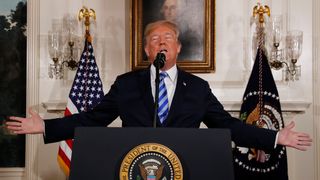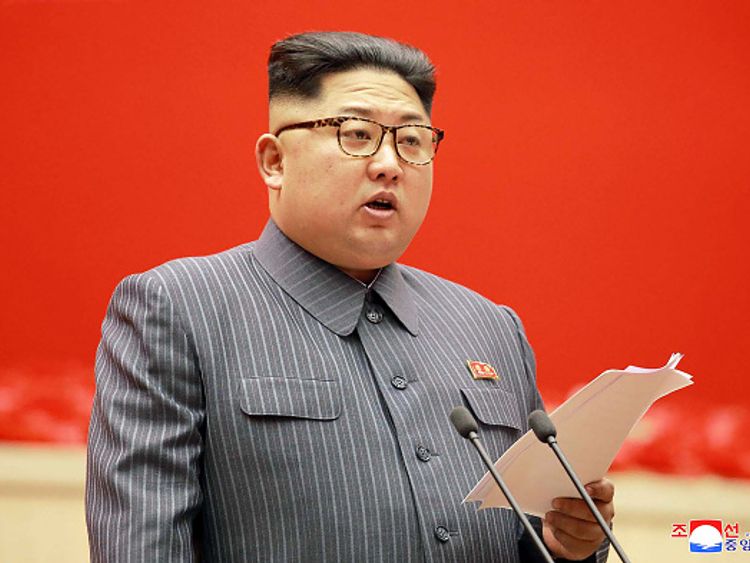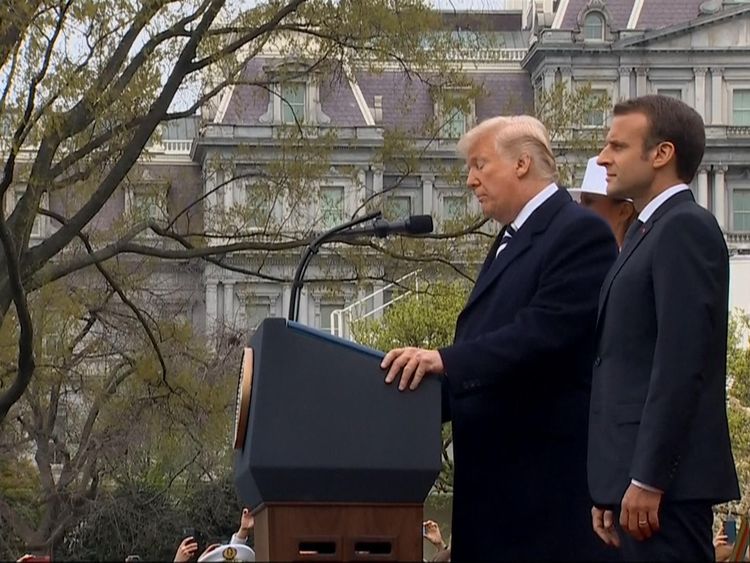So Donald Trump has kept his campaign promise and delivered a stunning and possibly fatal blow to an Iran nuclear deal he regularly described as "insane".
That he's done it is no real surprise, and nor should be the way he has done it.
It is straight out of the Donald J Trump foreign policy playbook and it has the clear imprint of his new national security adviser John Bolton.
It is difficult to overstate the significance of this move and is clearly the most important foreign policy decision of the Trump administration thus far.
His speech was uncompromising, full of rhetoric, implicit threats and ultimatums.
But Mr Trump's calculation is that Iran has been getting away with it for years, the deal does little to curb its military activities in the Middle East and the time had come to say enough is enough.
:: Trump has sent an earthquake through the Middle East
It has worked, Mr Trump would argue, with North Korea. And as he spoke – by coincidence or design – Secretary of State Mike Pompeo was on his way to Pyongyang to finalise plans for the much-anticipated summit.
Mr Trump believes it was the mix of stringent sanctions and threats of military action that finally brought Kim Jong Un to the table. He clearly believes the same will work with the regime in Tehran.
But there are huge questions as a result of Mr Trump's decision.
Iran is not North Korea and there is a battle in Tehran between hardliners, who want nothing more than to return to the days of confrontation and potential conflict, and moderates who may be more keen to renegotiate the deal.
It is unclear who will get the upper hand.
 1:51
1:51There is uncertainty over what happens next. Mr Trump has announced the reimposition of sanctions of the highest level.
But it will take between 90 to 180 days for those sanctions to take effect. Does America reach out to Iran to see if they want to negotiate in the meantime?
Does President Emmanuel Macron of France act as a go-between between Tehran and Washington? Or does Mr Trump just sit back and see what happens?
The other issue is that there really doesn't appear to be any Plan B. When you are trying to persuade someone to do something, you basically negotiate or you fight.
And the problem is if Iran now reacts to the crippling sanctions by walking away from the agreement and restarting its nuclear programme, the only option would be military action by the United States and/or Israel.

Both have said they will not allow Iran to develop a bomb. And then where does that military action lead?
It is much easier to start a conflict than to end one and the image of Syrian suffering casts a long shadow over dealings with Iran.
It is an inherently dangerous moment. Senior European diplomats are both aghast and anxious about somehow keeping some sort of deal with Iran together.
The longer Iran stays in, with or without the US, the better the chance of a peaceful resolution.
They believe the deal, flawed though it is, remains the best chance of curbing Iran's nuclear ambitions.

But suddenly things are highly unpredictable.
More from Donald Trump
Mr Trump has made his move. He does things differently and only time will tell if yet another gamble pays off.
Though Mr Trump would see it differently. He would argue that the gamble was staying in the deal.
So Donald Trump has kept his campaign promise and delivered a stunning and possibly fatal blow to an Iran nuclear deal he regularly described as "insane".
That he's done it is no real surprise, and nor should be the way he has done it.
It is straight out of the Donald J Trump foreign policy playbook and it has the clear imprint of his new national security adviser John Bolton.
It is difficult to overstate the significance of this move and is clearly the most important foreign policy decision of the Trump administration thus far.
His speech was uncompromising, full of rhetoric, implicit threats and ultimatums.
But Mr Trump's calculation is that Iran has been getting away with it for years, the deal does little to curb its military activities in the Middle East and the time had come to say enough is enough.
:: Trump has sent an earthquake through the Middle East
It has worked, Mr Trump would argue, with North Korea. And as he spoke – by coincidence or design – Secretary of State Mike Pompeo was on his way to Pyongyang to finalise plans for the much-anticipated summit.
Mr Trump believes it was the mix of stringent sanctions and threats of military action that finally brought Kim Jong Un to the table. He clearly believes the same will work with the regime in Tehran.
But there are huge questions as a result of Mr Trump's decision.
Iran is not North Korea and there is a battle in Tehran between hardliners, who want nothing more than to return to the days of confrontation and potential conflict, and moderates who may be more keen to renegotiate the deal.
It is unclear who will get the upper hand.
 1:51
1:51There is uncertainty over what happens next. Mr Trump has announced the reimposition of sanctions of the highest level.
But it will take between 90 to 180 days for those sanctions to take effect. Does America reach out to Iran to see if they want to negotiate in the meantime?
Does President Emmanuel Macron of France act as a go-between between Tehran and Washington? Or does Mr Trump just sit back and see what happens?
The other issue is that there really doesn't appear to be any Plan B. When you are trying to persuade someone to do something, you basically negotiate or you fight.
And the problem is if Iran now reacts to the crippling sanctions by walking away from the agreement and restarting its nuclear programme, the only option would be military action by the United States and/or Israel.

Both have said they will not allow Iran to develop a bomb. And then where does that military action lead?
It is much easier to start a conflict than to end one and the image of Syrian suffering casts a long shadow over dealings with Iran.
It is an inherently dangerous moment. Senior European diplomats are both aghast and anxious about somehow keeping some sort of deal with Iran together.
The longer Iran stays in, with or without the US, the better the chance of a peaceful resolution.
They believe the deal, flawed though it is, remains the best chance of curbing Iran's nuclear ambitions.

But suddenly things are highly unpredictable.
More from Donald Trump
Mr Trump has made his move. He does things differently and only time will tell if yet another gamble pays off.
Though Mr Trump would see it differently. He would argue that the gamble was staying in the deal.












